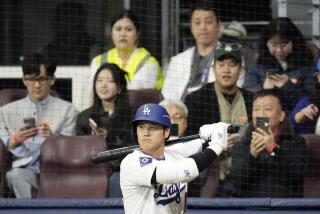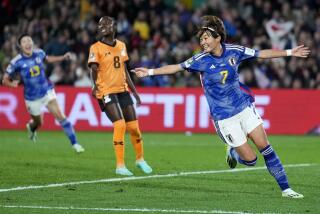Asian Embrace Warms Cup
SEOUL — Most of the world has never heard of Tran Thien, but to judge by what he has been up to lately, Tran Thien has certainly heard of the rest of the world.
Thien is a potter by trade, one who hails from the village of Bat Trang on the outskirts of Hanoi, Vietnam. What his hands have been shaping during the last few weeks and months are small porcelain figurines that he sells for about $1.30 apiece.
It’s not the price that makes them hot sellers, it’s the subject.
In a country that is mad about soccer and especially the World Cup, which kicks into gear Friday when defending champion France plays Senegal in the opening game, Thien has found a way to cash in on the fervor.
He has made and sold hundreds of tiny replicas of England’s David Beckham, Argentina’s Gabriel Batistuta, Brazil’s Ronaldo and many of the other players whose names are likely to decorate the sports headlines during the monthlong extravaganza.
This World Cup differs from the 16 that preceded it in two significant ways: It is the first to take place in Asia and it is the first to be jointly staged by two countries--South Korea and Japan.
The region has taken the 32-nation tournament to heart and has imbued it with a color and flavor all its own. Even countries that failed to qualify have found ways to be involved.
Take, for instance, Thailand.
There, at Klong Prem prison in Bangkok, those in charge of keeping the peace have come up with a unique way of doing so. They have organized a soccer tournament of their own, dividing the inmates into teams by nationality and staging their own “World Cup.”
In addition to the “host nation” Thailand, China, England, Germany and Nigeria will all be involved in what surely must be the only soccer tournament where no one wants to be in goal.
Thailand is also the home of Umawadee Siriaksorn, one of many fortune tellers and tarot card readers recently asked by Thai newspapers to separate the World Cup winners from the losers.
“Italy, France, Germany, Argentina and Brazil will fare well,” Umawadee said, “but ultimately France will win because it drew the sun card.”
Zinedine Zidane will be pleased.
Zidane, the elegant and influential midfielder who led France to the title four years ago in Paris, has been sidelined by a muscle tear in his thigh and will sit out Friday’s opener and possibly other games too.
The loss hurts France’s chance of becoming the first nation since Brazil in 1962 to repeat as champion. Others favored in the May 31-June 30 event are Argentina, Italy, Brazil, England and Portugal, the first of three teams the U.S. will face when it opens play June 5.
Senegal, meanwhile, was thrown off track a little itself this week when French-born starting midfielder Khalilou Fadiga was caught on a security camera allegedly trying to liberate a $240 gold necklace from a jewelry store in Daegu, South Korea. He faces criminal charges but will be allowed to compete.
The opening match pits France against one of its former colonies, but there is goodwill between the teams.
Most of Senegal’s players play professionally in the French league, while one of France’s standout players, Patrick Vieira, was born in Senegal.
Vieira will be taking over the playmaking role from Zidane.
“We just have to live with it because there’s nothing we can do,” Vieira said of Zidane’s injury. “Injuries can happen to anyone, anytime. But we can still win without him.”
Among the visitors in the sellout crowd at Seoul’s World Cup stadium Friday evening will be Japan’s Prince Takamado and his wife, Princess Hisako.
The pair arrived Wednesday, the first members of Japanese imperial family to make an official visit to Korea since the end of World War II.
The tournament, evenly split between the host nations, will feature 64 matches and will climax with the championship final on June 30 at Yokohama, Japan.
By then, the 1,093-foot Tokyo Tower, a city landmark for almost half a century, probably no longer will be lit up in blue, the color worn by Japan’s World Cup team.
Neither host nation is expected to go very far in the tournament.
Both, however, will be more than pleased if the event passes without the hooliganism that has marred previous World Cups.
And if it does, Japanese railway workers can go back to freeing the stones along their tracks.
They had glued them down to prevent them being used as weapons.
In Asia, the build-up to the World Cup has been strange, to say the least.






